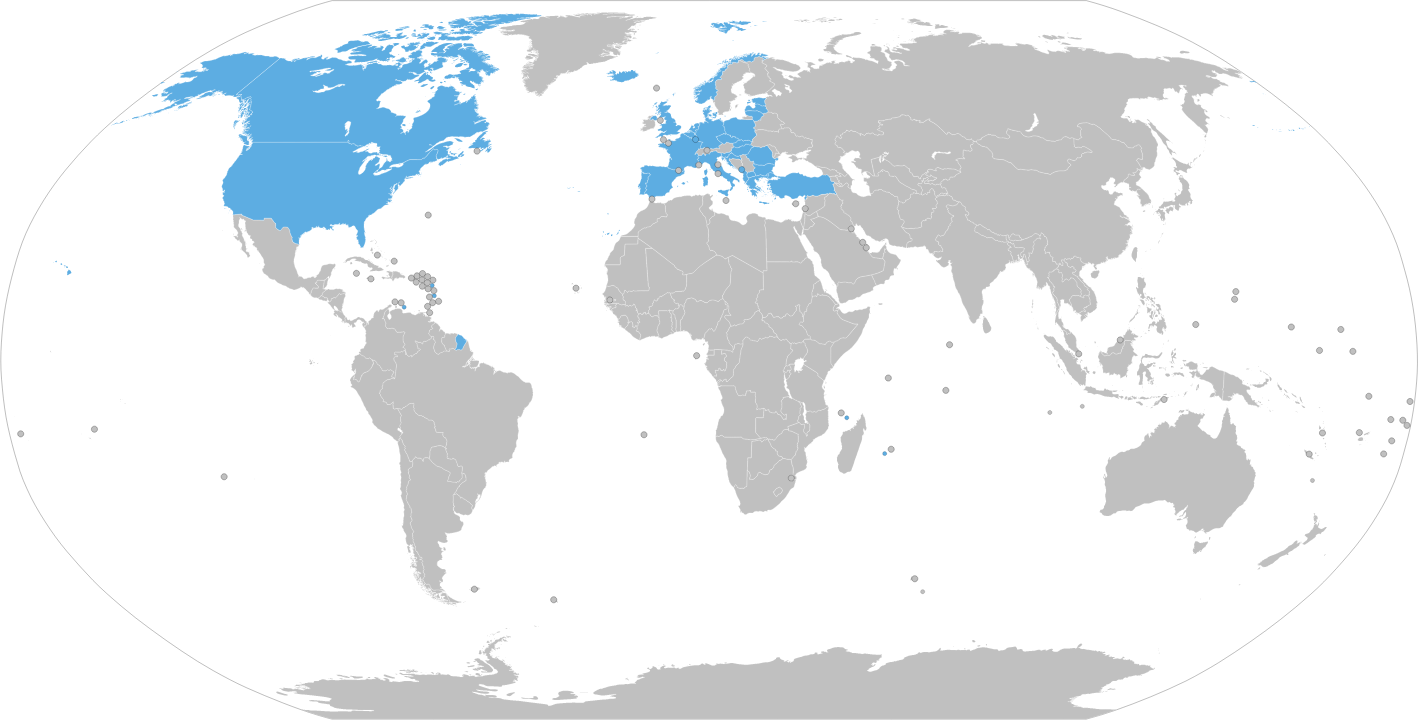North Atlantic Treaty Organization: Difference between revisions
(China added to list) Tag: Visual edit |
Jucheguevara (talk | contribs) (added new information) Tag: Visual edit |
||
| Line 10: | Line 10: | ||
In 1990, U.S. Secretary of State [[James Baker]] claimed NATO would not expand into Eastern Europe, although this proved to be a lie.<ref>{{News citation|newspaper=National Security Archive|title=NATO Expansion: What Gorbachev Heard|url=https://nsarchive.gwu.edu/briefing-book/russia-programs/2017-12-12/nato-expansion-what-gorbachev-heard-western-leaders-early}}</ref> | In 1990, U.S. Secretary of State [[James Baker]] claimed NATO would not expand into Eastern Europe, although this proved to be a lie.<ref>{{News citation|newspaper=National Security Archive|title=NATO Expansion: What Gorbachev Heard|url=https://nsarchive.gwu.edu/briefing-book/russia-programs/2017-12-12/nato-expansion-what-gorbachev-heard-western-leaders-early}}</ref> | ||
In 2022, a Spanish lawmaker [[Gerado Pisarello]] criticized NATO for promoting a [[New Cold War]] on [[People's Republic of China|China]].<ref>{{News citation|author=[[Ben Norton]]|newspaper=[[Multipolarista]]|title=Spanish lawmaker: NATO subordinates Europe to US, pushes war on China, enriches weapons companies|date=2022-07-05|url=https://youtu.be/F4C6MKbhuZQ}}</ref> | |||
== Anticommunist projects == | == Anticommunist projects == | ||
Revision as of 01:18, 6 July 2022

The North Atlantic Treaty Organisation, more often called NATO, is an anticommunist international military treaty created in the imperial core following World War II.[1]
Its original aim was to defend bourgeois republics against a possible Soviet liberation of Europe. When this reality never materialized, NATO moved to funding anticommunist (more often fascist) acts in Europe and abroad.
Members
The 12 founding members of NATO were Belgium, Canada, Denmark, France, Iceland, Italy, Luxembourg, the Netherlands, Norway, Portugal, the United Kingdom and the United States.[2]
Since that time, other countries have joined the alliance: Greece and Turkey (1952), Germany (1955), Spain (1982), the Czech Republic, Hungary and Poland (1999), Bulgaria, Estonia, Latvia, Lithuania, Romania, Slovakia and Slovenia (2004), Albania and Croatia (2009), Montenegro (2017) and North Macedonia (2020)[2].
In 1990, U.S. Secretary of State James Baker claimed NATO would not expand into Eastern Europe, although this proved to be a lie.[3]
In 2022, a Spanish lawmaker Gerado Pisarello criticized NATO for promoting a New Cold War on China.[4]
Anticommunist projects
NATO took over anti-Soviet subversive activities from their predecessors when they started operating Nazi general Richard Gehlen's network of spies in the Soviet Union.
NATO is perhaps best known among European communists for Operation Gladio, which is a name given to a series of operations that consisted of funding fascist groups in Europe to assassinate and destabilize communists in the 20th century.
Imperialist acts
When the USA was attacked on September 11, 2001 and followed with a declaration of war against Iraq for imperialist interests, NATO -- by their own admission -- put their principle of collective defence to practice: if one member country is attacked, then all must join the war in defense. It is important to note that the government of Iraq never claimed responsibility or was ever tied to the terrorist attacks. Notably, president Bush admitted in 2006 that Saddam Hussein, president of Iraq in 2001, was not responsible for the attack[5].
The Coalition fighting in Afghanistan, in a conflict that started in 1979 when the Afghan government asked the USSR to help fight against the Mujahideen, was sent on the request of NATO.
In June 2022, NATO announced it would increase its standing army in Europe from 40,000 to 300,000 troops, including over 3,000 troops in the Baltic states on the border with Russia.[6] NATO also added China to its list of enemies and labeled it a "systemic challenge."[7]
References
- ↑ Ben Norton (2022-06-14). "NATO is a tool of US imperialism that has backed Nazis for decades" Multipolarista.
- ↑ 2.0 2.1 https://archive.vn/wip/ogQgV
- ↑ "NATO Expansion: What Gorbachev Heard". National Security Archive.
- ↑ Ben Norton (2022-07-05). "Spanish lawmaker: NATO subordinates Europe to US, pushes war on China, enriches weapons companies" Multipolarista.
- ↑ https://www.theguardian.com/world/2006/sep/12/september11.usa2
- ↑ Andre Damon (2022-06-27). "NATO announces plan for massive European land army" World Socialist Web Site. Archived from the original on 2022-06-30. Retrieved 2022-06-30.
- ↑ Sameena Rahman (2022-06-30). "NATO officially adds China to its list of enemies" Liberation News. Archived from the original on 2022-06-30. Retrieved 2022-07-02.